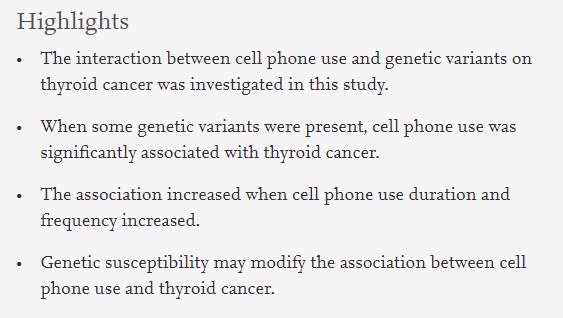
Abstract
Emerging studies have provided evidence on the carcinogenicity of radiofrequency radiation (RFR) from cell phones. This study aims to test the genetic susceptibility on the association between cell phone use and thyroid cancer. Population-based case-control study was conducted in Connecticut between 2010 and 2011 including 440 thyroid cancer cases and 465 population-based controls with genotyping information for 823 single nucleotide polymorphisms (SNPs) in 176 DNA genes. We used multivariate unconditional logistic regression models to estimate the genotype-environment interaction between each SNP and cell phone use and to estimate the association with cell phone use in populations according to SNP variants. Ten SNPs had P < 0.01 for interaction in all thyroid cancers. In the common homozygote groups, no association with cell phone use was observed. In the variant group (heterozygotes and rare homozygotes), cell phone use was associated with an increased risk for rs11070256 (odds ratio (OR): 2.36, 95% confidence interval (CI): 1.30–4.30), rs1695147 (OR: 2.52, 95% CI: 1.30–4.90), rs6732673 (OR: 1.59, 95% CI: 1.01–2.49), rs396746 (OR: 2.53, 95% CI: 1.13–5.65), rs12204529 (OR: 2.62, 95% CI: 1.33–5.17), and rs3800537 (OR: 2.64, 95% CI: 1.30–5.36) with thyroid cancers. In small tumors, increased risk was observed for 5 SNPs (rs1063639, rs1695147, rs11070256, rs12204529 and rs3800537), In large tumors, increased risk was observed for 3 SNPs (rs11070256, rs1695147, and rs396746). Our result suggests that genetic susceptibilities modify the associations between cell phone use and risk of thyroid cancer. The findings provide more evidence for RFR carcinogenic group classification.
https://www.sciencedirect.com/science/article/abs/pii/S0013935119308102?via%3Dihub
